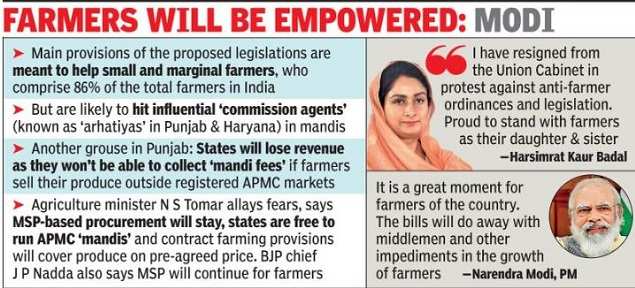
[ad_1]
Harsimrat, whose resignation was announced in the Lok Sabha by fellow Akali MP, and her spouse, Sukhbir Singh Badal, said the Akali Dal’s protest to the legislations was not heeded and it could never be a party to any decision that went against the interests of farmers.

The Akalis, who, along with Shiv Sena and Samata Party as JD(U) was called in its earlier incarnation, are the founding members of the NDA, did not spell out whether they intend to continue with the BJP-led grouping.
A total break-up of ties should not hurt BJP in Parliament, considering Akali Dal’s meagre numbers: the two Badals in LS and three MPs in the Rajya Sabha. However, coming after the bitter parting of ways with Shiv Sena, it will mark NDA being further whittled down.
In her letter to the PM, Harsimrat attributed her resignation to “the decision of the government of India to go ahead with the controversial bills without addressing and removing the apprehensions of farmers and the decision of the Shiromani Akali Dal not to be a part of something that is anti-farmer”.
Requesting the PM to accept her resignation with “immediate effect”, the minister said “before, during and after the promulgation of the three ordinances”, she had tried her best to persuade the cabinet to take the actual stakeholders of this decision, the farmers, on board and remove their apprehensions and concerns.
“All this while, I was given the impression that since an ordinance is only a temporary arrangement, my concerns and pleas would be addressed while legislating on the issue in Parliament,” Harsimrat said. She added that she was deeply hurt that despite her and her party’s persistent pleas and efforts in this regard, the government “had not taken farmers on board”.
“My party always followed the great Guru Sahiban who have taught us never to compromise on one’s principles and to stand up for what one strongly believes to be right. That is precisely what I am doing today,” she said.
Harsimrat, however, expressed satisfaction that she was able to live up to the expectations of the people who had placed their complete trust in her. “My decision symbolises my party’s vision, its glorious legacy and its commitment to go to any extent to safeguard the interests of farmers,” she said in her four-page resignation letter addressed to the PM.
However, the real significance of Harsimrat’s resignation lies in its timing. It comes at a time when influential sections of farmers in Punjab and Haryana have hit the streets to protest against the troika of legislations the government has brought in the current session to replace the three ordinances promulgated to restructure farm trade. The response of another BJP ally and coalition partner in Haryana, Jannayak Janta Party, which, like the Akalis, has the dominant Jat peasantry as its mainstay, would be worth watching.
The three contentious legislations are: the Farmers Produce Trade and Commerce (Promotion and Facilitation) Bill, 2020; Agreement on Price Assurance and Farm Services Bill, 2020, and the Essential Commodities (Amendment) Bill, 2020, the last one having been passed by Lok Sabha on Tuesday.
Part of the government’s Atmanirbhar Bharat push in the wake of the Covid-19 outbreak, the legislations are meant to liberalise farm trade by ending the monopoly of Agricultural Produce Market Committees and the dominance of middlemen or ‘arhatiyas’.
However, an influential group of farmers have claimed that marginalisation of mandis will lead to the domination of corporate houses which will, after initially offering blandishments to lure in farmers, acquire monopoly and reduce the producers to captives.
The government has so far stood firm in the face of protests, confined so far to farmers in Punjab, Haryana and a few pockets in western UP, and has defended the three bills as aimed at expanding the options of farmers by dismantling the regime which compelled them to sell their produce to mandis at prices determined by them.
Opposition parties have alleged the legislations will spell an end to the minimum support price regime, a charge which was strongly refuted by agriculture minister Narendra Singh Tomar in Lok Sabha.
The BJP leadership has kept the alliance with the Akalis despite serious misgivings of its Punjab unit which has maintained that with SAD patriarch Parkash Singh Badal fading away, the ally has become a liability because of the allegations of corruption, nepotism and high-handedness facing the new crop of leaders.
Apart from the consideration of NDA unity, BJP’s stand has been influenced by RSS’s view that the alliance acts as a bulwark against the attempt of Pakistan-inspired secessionists to drive a wedge between Sikhs and Hindus. This was one of the reasons why BJP did not explore the possibility of a tie-up with an influential non-Akali leader in the state who has been viscerally opposed to the Badals.
[ad_2]
Source link